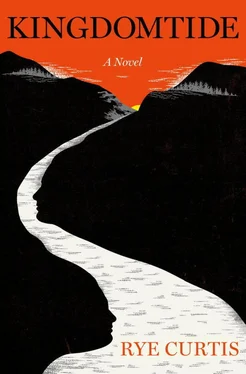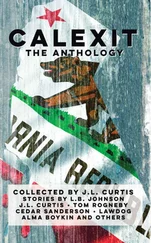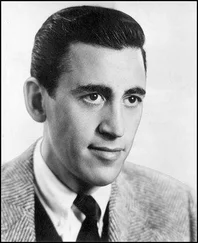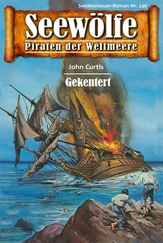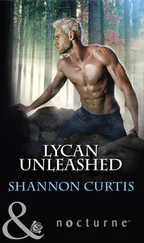I sat up and put my back to a stump by the river and kept my eyes shut against the sun. The blood in my eyelids made a monstrous wall of thumping red. Beads of sweat chased each other off my forehead and down my arms and tickled me something terrible like the little black flies and mosquitoes that pestered me most hours of the day. However I did not move. I was sick again and still I did not move nor open my eyes. I was a mighty pitiful sight.
A very nice doctor would later suggest to me that I had most surely ingested giardia from drinking unclean water out of my late husband’s boot. However I hold to this good hour that it was the animal I had eaten the species of which to this day I cannot name.
I thought again about how they might discover my body, terribly defiled and molested and inhabited by all manner of crazy wildlife. Likely my bones would be flung far and wide and no doubt the investigators would not be able, nor possibly see it necessary, to reassemble and identify them as having once belonged to an old Methodist from Texas named Cloris Waldrip. I wondered too if they would be able to tell how old I had been by the marks in my bones as they do with the rings in a tree.
Soon the afternoon had all but gone and the sun was hidden among opposite mountains and the colors of the valley deepened like day-old bruises. I mustered what little strength I had left and took the hatchet from my purse and scratched my given name into that stump. In my life I had not ever once considered that I would come to rest unburied at the foot of a grave marker of my own making, especially not one so evil and poor. It seemed as if my name there were a curse word meant to condemn me for all that I had done wrongly in my days. I suppose it just goes to show how awful little we can control the outcome of our decisions. Cloris. What a terrible word it was cut into that pale wood.
What I next recall was this: two eyes bodiless above me in the dark, the sky mighty black behind them, no starlight nor moon to it. Two bright emerald-green eyes such like those of Garland Pryle gazing down at me from the heavens. Here may be the face of God, I thought, bared before me. Or perhaps that of an angel lowered into the Bitterroot. A strong warm hand held the back of my neck and another cradled my head and raised me up. Then a soft voice told me to drink and I felt on my lips the cool brim of what I imagined was a silver chalice. The voice was gentle but strong like that of the masculine young woman who tended the service station back in Clarendon. Stokely, I want to believe her name was. She wore powder the way Chinese women do in costume plays. I drank. I do not recall the taste. I slept. I dreamt.
I dreamt of a humid room with no clean light where a translucent man shaped like a water tower stepped carefully around me with boots the size of cast-iron skillets. He endeavored not to wake me, but he did not know that I had been awake for centuries. I dreamt of a palace of mirrored floors where I could see up a gown I wore as I wandered its ornate halls, and in this palace was a woman with red hair. I could see up her gown too and under it was a series of inverted mountains and cosmic voids and angry children in multitude. But I dreamt most vividly of the little Cessna 340 airborne from Missoula, and in one of its bright windows I had a vision of a woman I had never seen before, a sad woman with dark hair cut short same as a man’s, looking for someone in those merciless mountains, her countenance incorruptible and without fear.
My dreams ended there and I could not blink nor shut nor open my eyes anymore and I woke to find that it was still very dark yet. I sat up and I put my fingers where I had scratched my name into the stump. I endeavored to get my wits about me. Firelight played over my name. Out at the river a man sat crosslegged by a twisted fire, stirring it with a smoking stick. Behind him the river shone in the firelight like a macabre river of blood. A white shirt masked the man’s face. The shirt had eyeholes cut out of a printed image of eggs and pancakes and the arms of it were tied around the back of the man’s head over a wild mane of long dark hair like a neckerchief. I suspect the shirt was made to be worn by the employees of a diner.
I had a notion the man was watching me, but he did not turn his head in my direction. He was a dread frightful sight, dirty and shadowy. However I was not all that afraid. I had put it together that this must have been the man who had been building fires for me every night and giving me supper. Despite the mask and his appearance, I was hopeful. And I mean to tell you at the time, as funny as I was feeling, I was not very sure if he was of this world or not. Either way sure enough there he sat.
I waited a little while before I asked him who he was.
The masked man looked up from the fire and dropped the stick. He wiped his hands on his blue jeans. He made no reply.
Then I asked him if he was an angel.
Still he said nothing and stood up at the fire, casting out a maniacal shadow. He looked like some timber-born deity. He was lean and must have stood five foot nine in his socks but his big old boots put him taller than that. He had on his hip a magnificent scabbard like I had seen worn in Shakespearean plays at the Little Theater in Amarillo. Later I would get a closer look at it and see that it was intricately metalworked with a bas-relief of what I have determined to be the English Battle of Marston Moor in 1644.
I said, My name is Cloris Waldrip.
He took a cautious step closer and in a deep and steady voice asked me how I felt.
Better, I told him.
Anyone else survive?
I shook my head.
How many people on the plane?
Two others, I said. The pilot and my husband.
The masked man sat back at the fire and picked out another stick and stirred the coals. I’m sorry, he said.
It is mighty strange the words people say to comfort each other. I hear them often in the halls here at River Bend Assisted Living. And I allow that there is no better recourse in the face of the grieving and sorrowful than to apologize, as if it were the fault of every man and woman who had ever begat a child that anyone should ever hold grief in their heart. I imagine that we are all culpable in every loss, every familiar window shuttered, every summer swimming pool drained, because surely we are loss itself. I am inclined to think that we alone on this earth know such a thing as grief exists, though my dear grandniece has informed me that some whales mourn their dead.
I sat against that stump and wrapped my arms around my legs and at last bawled into my knees like a crazy little girl until my face was fuzzy and fat like a dish sponge. I carried on that way for some time and when I did finally look up the man had gone but the fire still burned hot and bright.
Lewis, naked save for her boots, spun slow ovals in the living room and guzzled down a glass of merlot. She steadied herself at the mantelpiece and looked to the head of the doe mounted above. She smacked her lips and toppled over to the couch. Night blacked the windows and the radio sizzled after Ask Dr. Howe How ended with a frustrated caller complaining about the biennially scheduled anal sex in his marriage. Lewis grabbed a bottle of merlot from the coffee table and drank from it.
The regional office had mailed a photograph of Richard and Cloris Waldrip. Lewis took it up and studied it for maybe the dozenth time that hour. The old couple smiled together in front of dormant lovegrass and busted and blown mesquite. All but the woman’s hair keeled in the wind. Far behind them a white church house bowed askew, the copper steeplecross candescent like a branding iron held to the sky.
Lewis eyed again the doe’s head above the fireplace and looked back to the photograph. She looked closer at Cloris, the white hemisphere of hair, the miniature face and pinched smile. She left the photograph on the coffee table and stumbled from the couch. After she had dressed in her uniform and buckled the holster to her waist, she pulled from the wall the doe’s head nail and all and took it with her out the front door. She went around back of the cabin and got a shovel. She came back around to the front and dug a shallow hole in the gravel driveway and buried the head.
Читать дальше
Конец ознакомительного отрывка
Купить книгу
